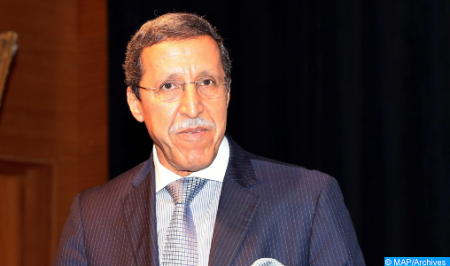UN Security Council Publishes Moroccan Ambassador’s Response to Algerian Peer
The UN Security Council has just published, in an official document, the response of Morocco’s Ambassador and Permanent Representative to the UN Omar Hilale, composed of four parts in which he dismantles Algerian Ambassador Nadir Larbaoui’s misleading letter dated on June 9. Algerian ambassador’s guilty silence In his letter to the Security Council, Hilale denounced obvious omissions and guilty silence, displayed without embarrassment, by the Algerian ambassador about the travels, financing, indoctrination, military trainings of the so-called Sultana Khaya and many other facts, directly implicating Algeria’s responsibility and complicity in the agitations of this activist and voice of the armed violence against civilians and separatism. These assumed omissions of the Algerian diplomat reveal his inability to provide tangible answers to the irrefutable and argued accusations of the Moroccan ambassador. This proves, if still needed, the main role of Algeria in the direct recruitment of the few separatist elements who, failing to convince by a peaceful speech in the respect of Moroccan laws, shamelessly resort to calls and incitement to murders, military action and attacks against public and private property. This is totally forbidden by international law, especially Article 19 of the United Nations Covenant on Civil and Political Rights, to which Algeria is a State Party. Algeria: an unquestionable party The response of the Moroccan ambassador to the denials of his Algerian colleague is a real charge sheet, damning for the primary responsibility of Algeria in this regional dispute, since its genesis in 1975 until today. Hilale’s indictment, contrary to the rhetoric and undiplomatic language of the Algerian diplomat, is distinguished by historical details, immutable truths, irrefutable proofs, indelible diplomatic writings that are listed in the Security Council (the letter of the Algerian RP to the SG of the UN, November 19, 1975, S/11881), assumed acts (CCPR/C/DZA/CO/4 and CCPR/C/134/D/2721/2016), decisions of interference in the internal affairs of other countries, reports of the Secretary General (S/2002/178) and Security Council resolutions (2468, 2494, 2548 and 2602). Hilale stressed that Algeria is cited 5 times, along with Morocco, in the last four resolutions of the Security Council, defeating the Algerian illusion of a pseudo observer status. Algeria’s condemnable blocking of the political process In his letter, Hilale also exposes the low maneuvering of Algeria which, by attacking the UN, vainly tries to avoid its direct responsibility in the current blockage of the round-table process. Hilale enumerates, one by one, Algerian obstruction’s multiple manifestations, the most indisputable of which is its letter to the Security Council of October 2021, firmly rejecting any reference to any commitment on its part to participate in the round-table discussions. The Moroccan ambassador has put Algeria face to face with its lies, which the international community no longer believes, especially when it shamefully tries to blame the UN for the blockage of the political process. He considered this act indecent and qualified it as a low maneuver and a tactic that even the friends of Algeria criticize on the side. The incomparable human rights situation in Algeria and the Moroccan Sahara To the false and unfounded accusations of the Algerian ambassador about alleged human rights violations in the Moroccan Sahara, and his call for the extension of MINURSO’s mandate to include the monitoring of the human rights situation “like all other PKOs [Peacekeeping Operations]”, Hilale replied, first of all, to the Algerian ambassador’s question about the human rights situation in the Sahara. Hilale responded, first, with the law, referring to the last 13 Security Council resolutions, all of which welcome “the measures and initiatives taken by Morocco, the role played by the National Human Rights Council Commissions in Dakhla and Laayoune, and the interaction between Morocco and the special procedures mechanisms of the United Nations Human Rights Council. He also criticized the blatant ignorance of his Algerian counterpart of the nuances and differences in the nature and mandates of UN peacekeeping operations. He reminded him that MINURSO is a traditional PKO with the sole mandate of supervising the ceasefire, adding, in this regard, that MINURSO is by no means the only UN peace operation that does not have a human rights component, as do seven other PKOs of the 12 currently operational. Finally, Hilale invited the Algerian ambassador to focus instead on the serious human rights violations in his own country, which have caused concern and condemnation by UN human rights officials and organizations. The High Commissioner for Human Rights, Michelle Bachelet, stated in her annual report to the Human Rights Council on March 8, 2022: “In Algeria, I am concerned about the increasing restrictions on fundamental freedoms, including the growing number of arrests of human rights defenders, members of civil society and political opponents.” In other words, Hilale’s message to the Algerian representative is that when Algeria’s house is made of glass, its diplomat had better not throw stones at his neighbor’s.

